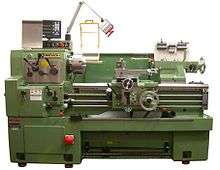Definify.com
Webster 1913 Edition
Lathe
Lathe
Lathe
Webster 1828 Edition
Lathe
LATHE
,Definition 2025
lathe
lathe
English

Alternative forms
Verb
lathe (third-person singular simple present lathes, present participle lathing, simple past and past participle lathed)
Etymology 2
From Middle English *lath, from Old English lǣþ (“a division of a county containing several hundreds, a district, lathe”).
Alternative forms
Noun
lathe (plural lathes)
- (obsolete) An administrative division of the county of Kent, in England, from the Anglo-Saxon period until it fell entirely out of use in the early twentieth century.
Etymology 3
From Middle English lath (“turning-lathe; stand”), from Old Norse hlað (“pile, heap”)—compare dialectal Danish lad (“stand, support frame”) (as in drejelad (“turning-lathe”), savelad (“saw bench”)), dialectal Norwegian la, lad (“pile, small wall”), dialectal Swedish lad (“folding table, lay of a loom”)—from hlaða (“to load”). More at lade.
Noun
lathe (plural lathes)
- A machine tool used to shape a piece of material, or workpiece, by rotating the workpiece against a cutting tool.
- He shaped the bedpost by turning it on a lathe.
- 1856: Gustave Flaubert, Madame Bovary, Part II Chapter IV, translated by Eleanor Marx-Aveling
- Of the windows of the village there was one yet more often occupied; for on Sundays from morning to night, and every morning when the weather was bright, one could see at the dormer-window of the garret the profile of Monsieur Binet bending over his lathe, whose monotonous humming could be heard at the Lion d'Or.
- The movable swing frame of a loom, carrying the reed for separating the warp threads and beating up the weft; a lay, or batten.
- (obsolete) A granary; a barn.
- (Can we find and add a quotation of Chaucer to this entry?)
Derived terms
Translations
|
|
Verb
lathe (third-person singular simple present lathes, present participle lathing, simple past and past participle lathed)
- To shape with a lathe.
- (computer graphics) To produce a three-dimensional model by rotating a set of points around a fixed axis.